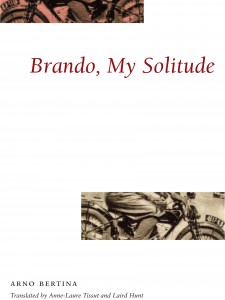Brando, My Solitude: A Biographical Hypothesis
 Brando, My Solitude
Brando, My Solitude
by Arno Bertina
Counterpath, Feb 2013
104 pages / $14 Buy from SPD or Amazon
Expectations, whether we like it or not, are typically the prime criteria people use to judge a work. They are the drive that propels us to even entertain the notion of diving into someone’s or some group’s creative endeavors to see if it proves enjoyable for us to consume. Movie trailers reconstruct segments of film under dramatic vein-twisting music to pull people into theaters by building expectations inside them. Agents tell novelists to get on twitter and be witty hoping for similar implanted affects. The trouble with these generated expectations in regards to literature in the modern day is that the market is so inundated with worthwhile and not-so-worthwhile work that the attention grabbing moves to the forefront of concerns, and, I can only speak for myself, but it conditions me to move on to something else if I don’t immediately like what I’m reading, or, in other words, if my expectations aren’t met. But underneath these battles of persuasion between personas and publishing houses lie modest works not meant for the fast-paced tastes of surface culture, works that transcend quick blurbs, ones so unconventional that distilling them into advertisements wouldn’t only prove insulting, but impossible, because their effects struggle to find correct wording.
Brando, My Solitude is just such a work that defies easy marketing, and by that I mean it’s truly a great book that slowly leads one deeper into its text, leaving space open to confound the reader with doubts before subtly working its magic. It’s the kind of book that expectations would kill; I found myself wondering at first if it was worthwhile to finish. Roughly the first twenty pages is a swirl of non-chronological, tangential narrative of a family, focusing on a nameless middle child, written in promising prose that show the signs of a good writer (and/or in this case translators). The narrator, the main character’s great-nephew, reveals himself as an unreliable biographer, one prone to uncertainty and honest vulnerability from a lack of facts or simply being there. A recounting of the events in the story would be boring and, frankly, useless, because it’s not the plot that really makes this story come alive, it’s the narrator’s perception and imagination on the facts given to him about his great-uncle.
The aspects of the main character’s life that are most interesting are the holes of mystery that cannot be filled. As the narrator says, “in this story hints are vehicles widely open to the wind, blowing in the fictions people most want to believe.” What reflects back on us as readers in this story are our assumptions on questionable events, our expectations of the most corrupt of human intentions driving the characters’ actions, for instance, the questionable births of both the main character’s and his wife’s children, each one possibly stemming from their respective supposed infidelities.
The truth of a life, after all, after all is said and done at the point of permanent death, are only the perceptions of others on the one in question, and his or her personal artifacts. The man in focus in this story is mythologized by his great-nephew for his freedom to stand in the face of provincial bigotry, cultural conventions, and familial behind-the-back whisperings on morality. The meaning of the title comes revealed to us through a personal journal, coded in Russian, as if locked away for its revealing nature by the man in question, on how he saw something outside of himself in another’s eyes that ultimately reminded him of his own personal plight through life. As the character ages, his eccentricities abound in the furthering expansion of his own solitude, and what we come to discover is that what truly makes a person who he or she is, are these eccentricities that too frequently get locked away, hidden from public light, the ones only allowed to flourish too late in life.
November 1st, 2013 / 11:00 am
